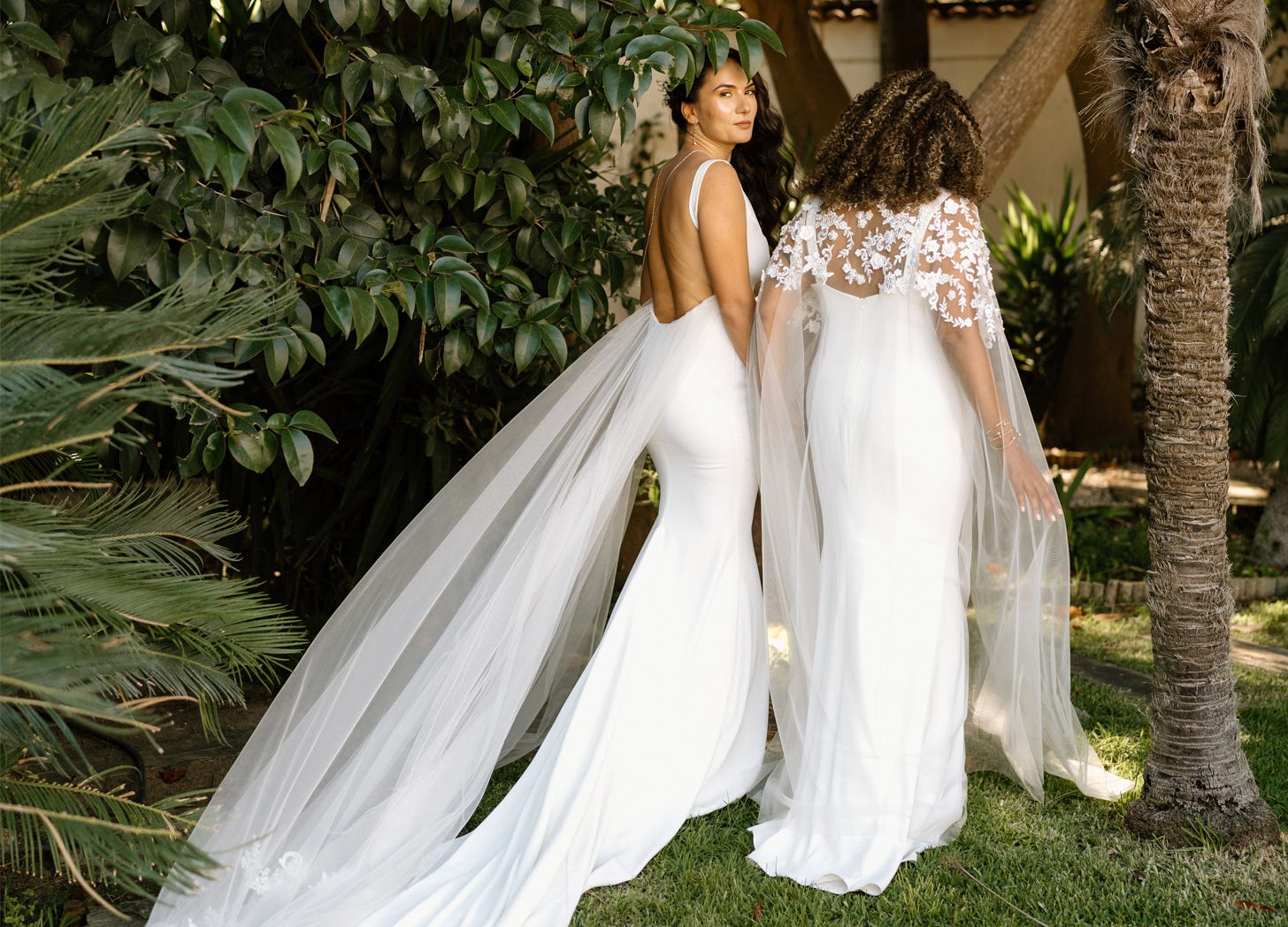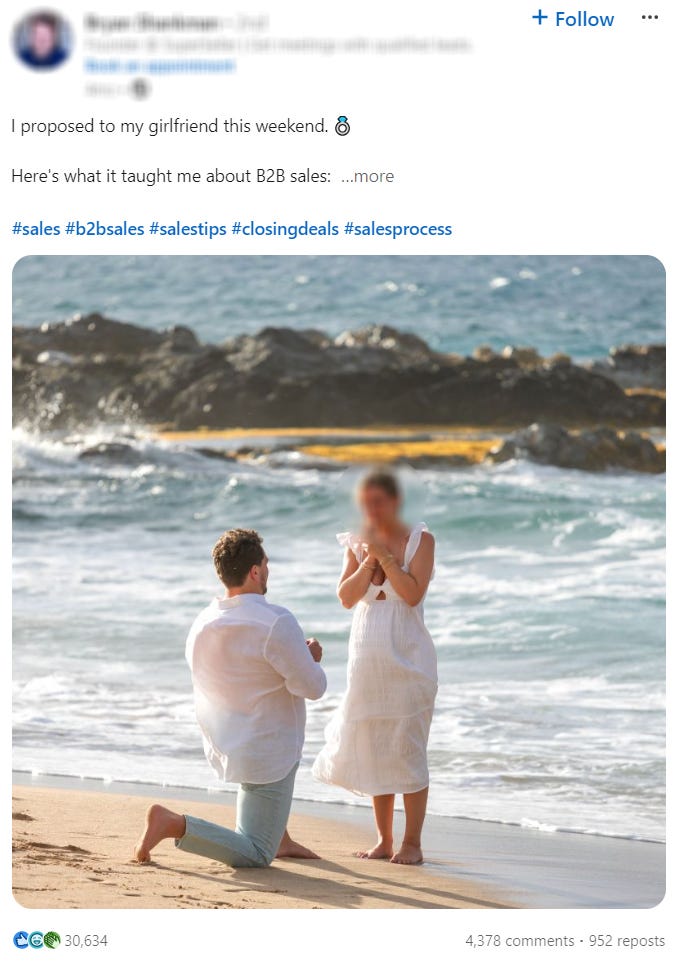Everything Is Content Now—and That's a Problem
Not every experience needs to be shared to be meaningful.
Remember that viral LinkedIn post from a few months ago - the one where a guy turned his marriage proposal into a B2B sales pitch?
The internet, predictably, went wild. Memes were made, jokes were cracked, and the poor guy became the poster child for how not to use LinkedIn.
My personal favorite:
I tripped over my dog this morning and realized—sometimes obstacles are right under our feet. Here's how to navigate them.
But this isn't about piling on or shaming someone who's probably had enough ridicule to last a lifetime. It's about examining why we've reached a point where even our most intimate moments are fodder for content—and why that's a problem.
Have we taken "leveraging personal experiences" to a whole new (and slightly uncomfortable) level?
I tied the knot myself, 2 months ago. Amidst all the excitement and chaos, the idea of turning such a deeply intimate moment into a LinkedIn post never even crossed my mind.
My wife and I felt the same way for our guests—some of whom were actual influencers. Our celebrant reminded them, "You've flown across the world to be here, today, for this moment; so be here, today, in this moment. We have a photographer who will capture everything, and we'll send you the photos."
It was refreshing to keep things genuine and personal, resisting the urge to transform our wedding into another content opportunity.
Not every experience needs a hashtag.
Not every emotion requires an audience.
Not every experience needs to be shared to be meaningful.
When we blur the lines between personal milestones and professional content, we risk trivializing experiences that are inherently meaningful. We also expose ourselves to a public that may not respond the way we hope. The LinkedIn user who shared his proposal probably thought he was being innovative, instead, he faced ridicule and backlash—imagine having such a negative association attached to, what should have been, one of the happiest memories of your life.
Don't get me wrong—I understand the allure of sharing. In a world of "pics or it didn't happen," the pressure to document and distribute every facet of our lives is real. But when did we start viewing our most intimate experiences as untapped content opportunities?
Why are we so eager to turn our lives into a continuous feed of consumable content for strangers online?
Perhaps it's the dopamine hit from likes and comments. Maybe it's the pressure to build a personal brand, or maybe we've just simply forgotten how to keep things to ourselves.
As marketers, professionals, and human beings, maybe it's time we ask ourselves:
Are we sharing to connect, or are we broadcasting to collect engagement?
Are we valuing experiences for their intrinsic worth, or for their content potential?
Can we allow ourselves to be fully present, without feeling the need to document and dissect every moment?
When we constantly convert personal experiences into content, we risk more than just annoying our network—we potentially harm our mental well-being.
So many studies have already been done on this. Here’s why:
Perpetual Performance Mode: when life becomes content, every moment is a performance. We're not just living; we're curating, editing, and strategizing. This perpetual state of self-scrutiny can lead to increased anxiety and stress. We're always "on," worried about how our experiences will be perceived by others.
Intrusion on Intimacy and Privacy Concerns: sharing intimate moments with an online audience can open you up to safety risks online. There's a delicate balance between sharing and safeguarding our personal lives. Remember that nothing can ever truly be deleted from the internet.
Validation Dependency: relying on likes, shares, and comments to validate our experiences can create a dependency that's hard to break, so much so that fluctuations in online engagement can lead to self-doubt and negatively impact your self-esteem.
Again, I get it and am not immune to it myself—social media platforms constantly encourage us to share, share, share, blurring the boundaries between personal and public life and normalizing this behavior. Yet, we still need to pause and consider the cost.
In a world that's increasingly interconnected yet paradoxically isolated, perhaps the most radical act is to experience life without an audience. To embrace moments for what they are, not what they could become online.
So, what's the solution? Well, I can think of 3:
1. Before hitting "post," consider why you're sharing and who truly benefits from it. Is this adding value to others, or are you seeking validation?
2. Keep certain experiences private to preserve their significance. Not everything needs an audience.
3. Focus on genuine connections rather than accumulating internet points. Meaningful interactions should trump high follower counts.
When I saw that marriage proposal turned into a sales pitch, I couldn't help but feel a mix of amusement and concern. Are we so desperate for content that we're willing to mine our most intimate moments for engagement?
But hey, I've never gone as viral as that guy on LinkedIn, so perhaps I'm doing it all wrong...
P.S. I've decided to share my wedding photo because same-sex marriage is legally performed and recognized in (only) 36 countries. Visibility matters. Not all sharing is harmful; sometimes, it’s exactly what’s needed to drive meaningful change.
Yes, I did get my wife’s permission to post it.

What about you? Have you ever felt the pressure to turn your life into "content?"
Liked this post? You’ll probably like my future posts, subscribe to get notified.





This is such a great post. It’s as if LinkedIn has become the B2B version of Oprah. Do you think this trend will fade or get worse,